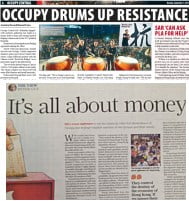Hong Kong wakens to cruelly dashed hopes and dreams this morning, as Occupy Central doesn’t materialize and thus give us the day off – or force us to ‘work from home’, as the Human Resources people quaintly put it. Some other time, no doubt. If Hong Kong’s pro-democrats are engaged in a cunning war of attrition, they are going the right way about it: thousands of cops are being deployed in case the Big Sit-In erupts, and it can only be a few weeks before the Police overtime budget runs out.
Beijing’s official announcement yesterday of Hong Kong’s election method for 2017 confirmed what we already knew. Up to now, the Chinese Communist Party has selected Hong Kong’s Chief Executive behind closed doors and had a local rubber-stamp ‘Election Committee’ hold a make-believe vote to make it look supposedly semi-democratic. In a big step for a Leninist one-party regime, Beijing is now willing to select a shortlist of candidates behind closed doors, have the rubber-stamp (renamed) ‘Nominating Committee’ hold a make-believe vote on the list, and then allow the three million or so voters to choose one via universal suffrage.
This is obviously not real democracy. The Civic Party’s Ronnie Tong cried on hearing the announcement, and the Democratic Party’s Emily Lau was so desolated that she couldn’t bring herself to go ballistic with a frenzy of brain-exploding ranting and fury. Were the pro-dems sincerely expecting real universal suffrage within China’s one-party framework? This is a genuinely intriguing question. Have years – decades – of struggle for the abstract principle of democracy blinded them to the post-1997 reality that a totalitarian government will not permit a rival to run against it in an open poll? Or are they well aware of that, and are just pretending to be outraged for effect or to feel good? Either way, it does not reflect well on them.
 Nonetheless, they have a serious fight on their hands. Beijing has all but declared war on reformists in Hong Kong. From smears, to computer hacking, to contrived mass mobilization, to hijacking once-respected law-enforcement agencies, to threats of bloodshed, to trundling military vehicles through the streets, we are witnessing a campaign of unprecedented severity. That such an approach is probably counterproductive in Hong Kong suggests that it is not specifically about this city: it is about this city in the overall context of Tibet, Xinjiang, Taiwan, the South China Sea, multinational companies in the domestic market, the Internet, independent churches, the ‘anti-corruption’ purges, immeasurable economic imbalances and all the other demons haunting China’s paranoid leadership. Hong Kong is an example and must be tamed.
Nonetheless, they have a serious fight on their hands. Beijing has all but declared war on reformists in Hong Kong. From smears, to computer hacking, to contrived mass mobilization, to hijacking once-respected law-enforcement agencies, to threats of bloodshed, to trundling military vehicles through the streets, we are witnessing a campaign of unprecedented severity. That such an approach is probably counterproductive in Hong Kong suggests that it is not specifically about this city: it is about this city in the overall context of Tibet, Xinjiang, Taiwan, the South China Sea, multinational companies in the domestic market, the Internet, independent churches, the ‘anti-corruption’ purges, immeasurable economic imbalances and all the other demons haunting China’s paranoid leadership. Hong Kong is an example and must be tamed.
Free and open elections are not attainable. But many in Hong Kong would prefer something more prosaic, anyway: lower rents, cheaper necessities, better jobs, less crowding on transport, fairer allocation of education and health services and hope for a better future. Conveniently, a Mainland legal academic came to Hong Kong last week to link the political and economic spheres and say – in effect – that democracy cannot be allowed because Beijing wants to protect and maintain the economic system that forces everyone to toil in order to enrich a small clutch of family-owned cartels. The Beijing-loves-tycoons thing goes back to the 80s, but what a time to blurt it out. As Bloomberg neatly put it: To Save the Rich, China Ruins Hong Kong. (A South China Morning Post column today also addresses the issue, as does MarketWatch.)
The pro-democrats have never been able to unite on down-to-earth issues. The fancy lawyers at one end of the spectrum work for property developers, own nice apartments and send the kids to college overseas; the ‘grassroots’ labour-types at the other end demand welfare, basic pensions and capped working hours. A third grouping, emerging only within recent years, are the young – and they perhaps have more of a clue about the links between cronyism, Beijing and their own lives. If the pro-dems want to arouse the people and take the fight to the Chinese government, this is the way to go when the civil disobedience gets going: shut up about nominating committees and start talking rents, schools, cartels, tycoons, ripoffs, inequality and unfairness.

